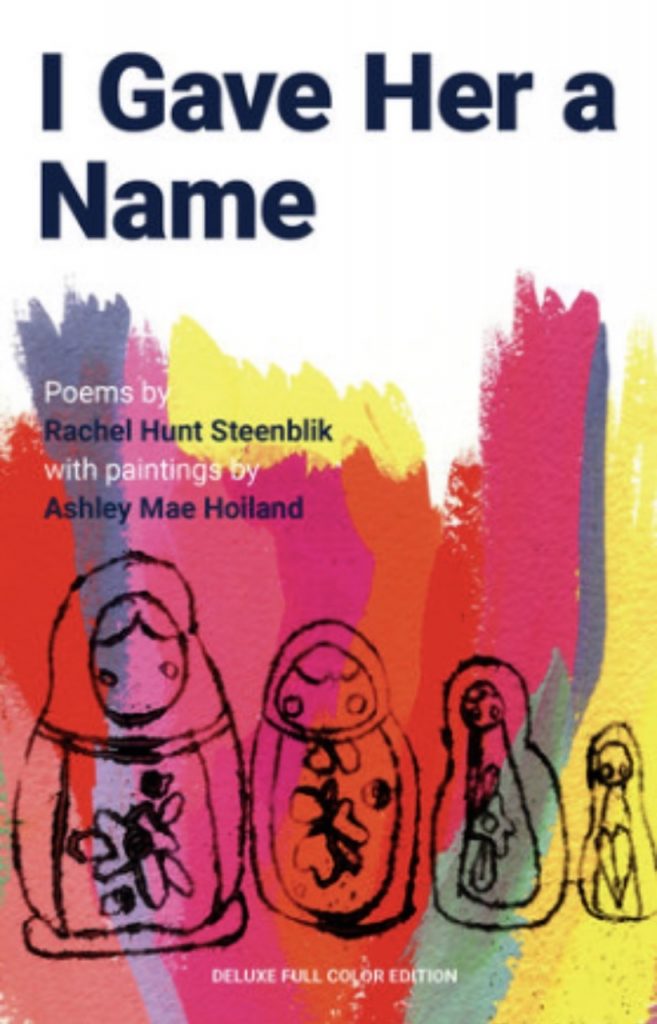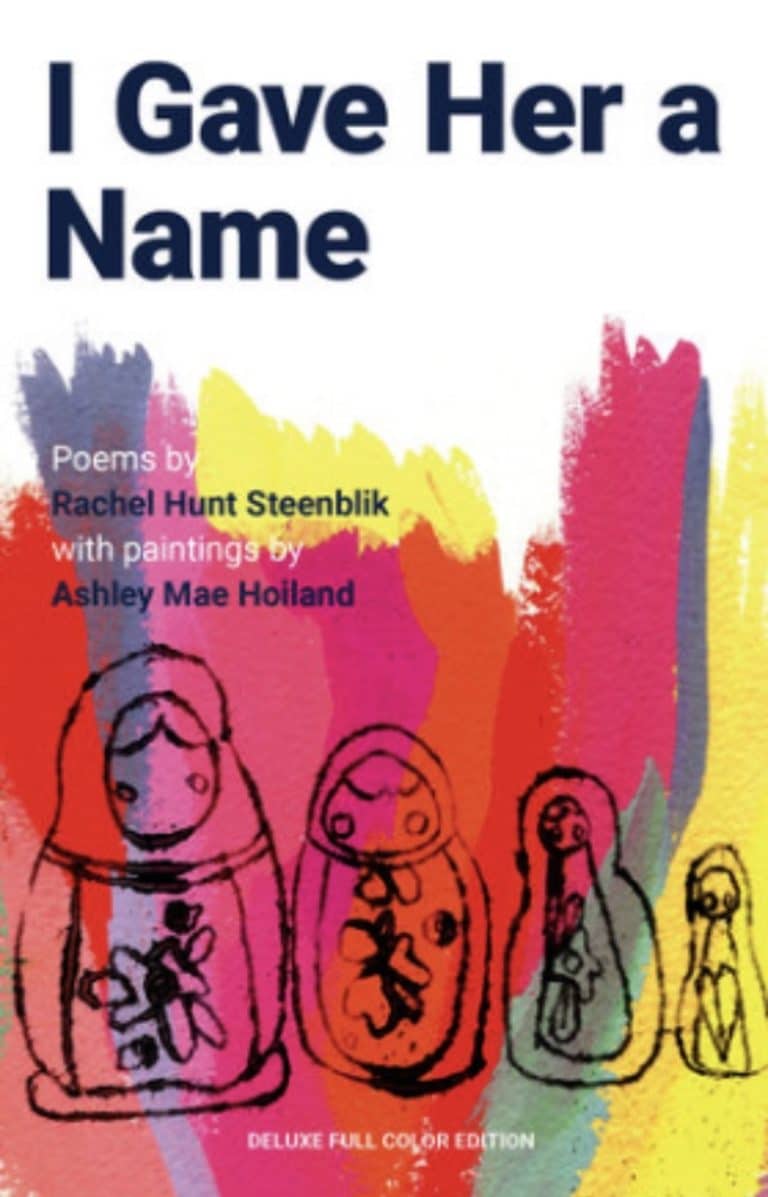
April 2019
By LMA
I have written on the blog about my experience reading Rachel Hunt Steenblik’s poems for the first time. I wrote that reading her poems was like finding water in the desert, and it still is. One of the major reasons for this is my relationship with my mom. I’m not able to have almost any contact with my mom, and it’s one of the most delicate, excruciating, and devastating things that’s happened to me. I’m not able to call her for help, just to talk, or to feel comforted, and connected, and safe. Not having that ability or choice creates a wound so painful and that there aren’t words for it. Because of that, developing and being comforted by my connection to Heavenly Mother and other women around me is one of the most precious resources I have.
There are so many important themes that are explored in the lovely book “I Gave Her a Name.” Here are a few that brought me so much comfort and connection to myself and to Heavenly Mother:
Theme 1: Heavenly Mother is multifaceted and complex, and embodies dialectical and opposing traits. This is one of the things I loved most about how Heavenly Mother is represented in this book. The poems make clear Heavenly Mother is not just one thing, and she embodies multiple opposing traits and characteristics at any given moment. For example, Heavenly Mother simultaneously embodies both profound power and softness. In the poem “Her Brightness and Glory,” (p. 58), it says she “is total brightness, then darkness, then brightness again.” In addition, Heavenly Mother is also powerful, assertive, brave, and directive (see What Lin Taught Me, p. 14) and at the same time, also extremely delicate and gentle (see Somewhere to Lay His Head, p. 55). I love this because different children and different circumstances require Heavenly Mother to use and exercise different traits in our behalf. Sometimes she needs to be very power-assertive and directive in helping protect and attend to her children. Sometimes she needs to be very soft and delicate. The poems in “I Gave Her a Name” illustrate how she embodies both, and does so with confidence and self-assurance.
Theme 2: Heavenly Mother embodies human traits, emotions, and experiences. The poems describe in such beautiful detail how even though Heavenly Mother has so much power beyond being human, She is also human just like we are. The poems describe how Heavenly Mother knows loss and pain and happiness and joy and all of the human traits, emotions, and experiences that we have. The poems about emotions in particular are lovely. For example, the poems make clear Heavenly Mother experiences emotions such as being scared (see Stoic Mother, p. 65), crying (see The God Who Weeps, p. 125; The Mother Cried Power, p. 126; How Heavens Weep, p. 136; Why Heavens Weep, p. 137; What Lisa Taught Me, p. 137), and feeling anger and rage (see On Female Anger, p. 12; What Laurel Taught Me, p. 126; What Rebecca Ann Taught Me, p. 128; Moon Mother, p. 173).
In addition, the poems and artwork also describe how Heavenly Mother experiences some of the most vulnerable, delicate, and powerful parts of having a body. For example, the poem “Space” beautifully talks about Heavenly Mother’s love for her growing and changing body:
Space
The mother is not afraid of
Her growing body,
Her still swollen breasts,
Her soft belly.
She knows
She deserves to
take up space.
She knows
Her space
brought forth
the world.
The poems also describe other delicate and vulnerable human experiences. For example, Heavenly Mother knows about the pain of being sexually assaulted and the ways she’ll respond when that happens (have a tissue ready and see She’ll Say, p. 83). She also knows what it’s like to be cast out and alone in the wilderness (see Exile, p. 264). The poems also talk about the places in her body Heavenly Mother holds her experiences and what’s happened to her, and also what’s happened to us (see Where She Carries, p. 168). Heavenly Mother knows our bodies hold infinite wisdom and information about what’s happened to her, and also what’s happened to us.
Theme 3: Heavenly Mother caretakes us is so many varied, individual, intricate, and intimate ways. “I Gave Her a Name” also beautifully describes how Heavenly Mother caretakes all of her children. This illustrates her creativity, flexibility, directiveness, practicality, and consistency. In her caretaking, Heavenly Mother calls attention to others’ pain and those who are forgotten, such as women, mothers, women who aren’t mothers (either by choice or not by choice), refugees, immigrants, widows, orphans, strangers, and others (see The Unseen Mother, p. 29; The Unheard Mother, p. 135; Blood Issues, p. 143). She is political. She sees and bears witness to mother and child separation, and she sends angels to minister to mothers and their babies, and people to fight for them (see She Witnesses, p. 63). She makes it clear she would “cross any border, She would climb any wall, She would do anything for Her children” (see What Karim Taught Me, p. 63).
The poems also demonstrate Heavenly Mother does and values doing the day-to-day things that bring us comfort and safety, such as keeping watch while we sleep and greeting us before and after bed (see The Lamplighter, p. 46), checking her notifications many times a day to see if we’ve called/texted/reached out (see To See if We’ve Called, p. 26), and putting Paw Patrol bandaids on our scraped knees (see She Succors the Weak, p. 17). She will even send proxies to help us, for example, someone to clean us up and comfort us in her place (e.g., giving us a sip of water, a popsicle (see Proxies, p. 29).
In addition, one of the primary ways Heavenly Mother caretakes us is through comforting and being soft and gentle with our pain. Heavenly Mother sits with and comforts everyone (e.g., with outcasts, those who are dying, those who are in labor; see What Margaret Taught Me, p. 28). She goes with us places (see Of a Good Courage, p. 78) and she knows all of our stories (see Well-Behaved Women, p. 62). When she can’t go with us places, she blesses us and offers comfort (see What Steven Taught Me, p. 88). When things are desperate, she leaves her throne and comes down to us (see What Joe and Gina Taught Me, p. 138).
Theme 4: We are intimately connected as women to each other, and to our Heavenly Mother in lovely, intricate ways. The poems and the artwork in “I Gave Her a Name beautifully describe the intimate and comforting connections we have as women to one another, and also to our Heavenly Mother. These connections begin inside ourselves, and then to our earthly mother, and all the way back to Eve inside Heavenly Mother (see Matryoshka Dolls, p. 34, Mother Lines, p. 35). We are also connected to Heavenly Mother through our DNA (see What Heidi Taught Me, p. 37) and through nature and the Earth, which are Heavenly Mother (see “The/Her,” p. 40).
The connections between us as people and as women are demonstrated by the lovely paintings by Ashley Mae Hoiland. For example, the artwork includes women of varying ages (e.g., p. 158, 262), body sizes (e.g., p. 141, 161, 237, 241, 266, 269), and even generations. Some of the artwork includes pioneer women and our foremothers (e.g., p. 164 and 167). The artwork also depicts lovely scenes of animals and in nature, such as birds (p. 169) and the earth and moon (e.g., p. 116)
I cannot recommend this lovely book enough. I hope when you read it you feel safe and comforted and empowered and connected to yourself, others, and Heavenly Mother.
What are the themes and poems that spoke to you? How did it make you feel?
For a bulleted list of the poems according to the themes discussed in this review, please click here.






8 Responses
Thank you for this exhaustive, informative review, LMA! You are a gift to the blog. ❤️
Wendy, thank you for this. You are so kind and supportive and lovely, I can’t tell you how much I appreciate that (insert many heart emojis).
This review made me the good kind of cry. Thank you for reading and reviewing and doing both with so much thoughtfulness and care. I’m so grateful it meant something to you, and your wishes at the end that it will leave others feeling closer to their Mother in Heaven, themselves, and other women (and nature!) around them are my exact hopes. You articulated it so well. <3 <3
This means so much to me, thank you for taking the time to say it. I’m so grateful for you and for these beautiful poems. I can’t tell you how much they mean to me.
LMA – I love this review and the book itself. Sometimes I struggle with a concept of Heavenly Mother (and earthly mothers too) but the poems are so inviting and relatable.
Thank you, you are always so kind. I really appreciate your openness and perspective about both kinds of mothers (Heavenly and earthly). I struggle with it a lot too, and I’m so grateful for these lovely poems.
To tell the truth I don’t worship a Heavenly Mother nor do I miss such a worship.
That’s totally good and okay, thank you for sharing it. I think the most important thing is that all of us make our beliefs and values work for us, and not the other way around.